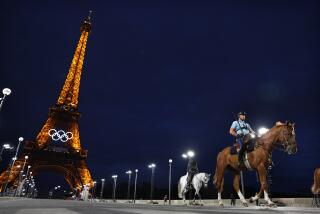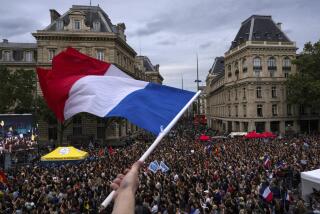Protests Escalate as French Nuclear Tests Near : South Pacific: Activists are arrested in Paris, Greenpeace divers are detained near atoll. More demonstrations are planned today.
- Share via
PARIS — France, on the verge of resuming nuclear tests, battled growing protests worldwide Friday, from the streets of this capital, where police arrested 300 demonstrators, to the waters near a South Pacific atoll, where French commandos boarded a Greenpeace ship and seized several divers.
The surge of protests came on the first day of September, the month that President Jacques Chirac has said France will begin seven or eight nuclear test blasts in the South Pacific. The first of those tests is expected any day, and activists have geared up to continue their protests today.
In Paris, police arrested anti-nuclear protesters who had defied a ban on their demonstration. Activists had tried to form a human chain through central Paris to carry petitions bearing 3 million signatures to Chirac’s office. A day earlier, officials closed a lock on the Seine River, preventing a Greenpeace vessel from joining the protest.
But the most dramatic protests came in the South Pacific around the tiny French atoll of Mururoa, where at least some nuclear tests are to be conducted. French commandos stormed the Greenpeace flagship Rainbow Warrior II, a sister vessel and nine inflatable boats, detaining nearly a dozen activists and towing the vessels out of the area.
The environmental group said several of its divers also were detained after they swam into the Mururoa lagoon beneath the testing platform. The Reuters news service quoted an unnamed French official in Papeete, Tahiti, 750 miles from the atoll, as saying two Greenpeace divers were detained.
*
Xavier Pastor, a Greenpeace campaigner aboard the MV Greenpeace, was quoted Friday as saying the campaign would continue. “This is only the beginning of the protest,” Pastor said. “We have said we will do all we can to stop the entire series of tests, and this is just the first attempt.”
A spokesman for the French Atomic Energy Commission said Friday that France would probably not begin its nuclear tests until next week. The French government has said that the nuclear devices will be detonated at one of two atolls, Mururoa or Fangataufa, both in French Polynesia.
Chirac, who calls his decision “irrevocable,” has ignored growing pressure to rescind it in recent months. The French government contends that the tests are necessary to give officials the data they need to conduct future tests by computer simulation, and it has appealed to other European countries to support it, suggesting they would be included in France’s nuclear deterrent umbrella. Chirac also has promised to sign a nuclear test ban treaty after the tests are concluded in May.
The protests--by everyone from political leaders in the region worried about possible environmental damage to anti-nuclear activists--already have escalated. Anti-nuclear groups have called for boycotts of French products, and protesters have burned the French flag and occupied French embassies.
*
Several governments have also lodged official protests. In France, 1,200 scientists signed a petition this week decrying the tests, and union leaders have threatened strikes.
Dozens of activists have also occupied a military runway in Papeete. They waved signs and banners before riot police forced them off the tarmac.
As many as 3,000 people marched through the streets of Melbourne, Australia, on Friday night, lying on the ground while protesters burned red flares, said to symbolize death by radiation.
And in Lausanne, Switzerland, 20 protesters occupied two French diplomatic offices; a sign they put in one office window said the offices were “closed because of nuclear tests.”
Even larger rallies were planned for today in Papeete, where 100 lawmakers from Japan, Australia, New Zealand and European countries planned to join thousands of protesters in a march through the streets.
Among the legislators were two dozen members of Japan’s Parliament, led by Finance Minister Masayoshi Takemura, who were for the first time protesting foreign actions overseas.
“France and China are the birthplaces of the world’s greatest and oldest cultural achievements,” Takemura said before leaving. “Yet as a politician in the nuclear age, I am deeply disappointed in France and China’s nuclear testing.”
Takemura’s decision to participate in the demonstrations has come despite objections from Japan’s Foreign Ministry and some members of the ruling coalition. Three members of his delegation also plan to sail aboard Greenpeace vessels to within 12 miles of the testing site as part of a “peace flotilla.”
Hours before their departure, at a send-off rally organized by consumer and environmental groups, the politicians posed with the 20-foot “Stop Nuclear Testing” banner they will carry in today’s march. The rally ended with a toast with Australian--not French--wine, provided by the activists.
And in Hiroshima, at one of many protests across Japan on Friday, children and grandchildren of atomic bomb survivors began a hunger strike.
Kraft reported from Paris and MacGregor from Tokyo.
More to Read
Sign up for Essential California
The most important California stories and recommendations in your inbox every morning.
You may occasionally receive promotional content from the Los Angeles Times.














